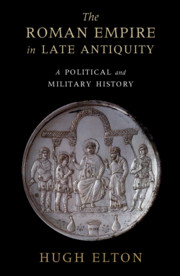Book contents
- The Roman Empire in Late Antiquity
- The Roman Empire in Late Antiquity
- Copyright page
- Contents
- Illustrations
- Maps
- Abbreviations
- Notes on Names, Places, and Titles
- Introduction
- 1 The Late Third Century, 260–313
- 2 The Early Fourth Century, 313–363
- 3 The Military Situation, 260–395
- 4 The Late Fourth Century, 363–395
- 5 The Early Fifth Century, 395–455
- 6 The Late Fifth Century, 455–493
- 7 The Military Situation, 395–493
- 8 The Late Fifth and Early Sixth Centuries, 491–565
- 9 The Late Sixth Century, 565–610
- 10 The Military Situation, 491–610
- 11 The Reign of Heraclius, 610–641
- Conclusion
- Glossary
- Primary Sources
- Index
- References
9 - The Late Sixth Century, 565–610
Published online by Cambridge University Press: 29 October 2019
- The Roman Empire in Late Antiquity
- The Roman Empire in Late Antiquity
- Copyright page
- Contents
- Illustrations
- Maps
- Abbreviations
- Notes on Names, Places, and Titles
- Introduction
- 1 The Late Third Century, 260–313
- 2 The Early Fourth Century, 313–363
- 3 The Military Situation, 260–395
- 4 The Late Fourth Century, 363–395
- 5 The Early Fifth Century, 395–455
- 6 The Late Fifth Century, 455–493
- 7 The Military Situation, 395–493
- 8 The Late Fifth and Early Sixth Centuries, 491–565
- 9 The Late Sixth Century, 565–610
- 10 The Military Situation, 491–610
- 11 The Reign of Heraclius, 610–641
- Conclusion
- Glossary
- Primary Sources
- Index
- References
- Type
- Chapter
- Information
- The Roman Empire in Late AntiquityA Political and Military History, pp. 283 - 303Publisher: Cambridge University PressPrint publication year: 2018

